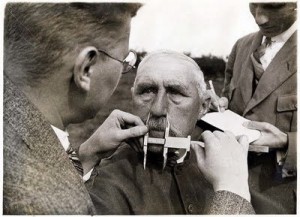I have come to detest the social sciences.
I know that I should not. I know that the search for truth is an honorable thing. But the means for coming to know the truth must be adequated to the object you are studying, and the two most popular means for knowing the truth about mankind are, I think, utterly inadequate.
One is adopted from physics, and seeks to present human realities in statistical form. The other is adopted from Freudian psychoanalysis, whereby the relation of a single “case study,” often from the subject’s own point of view, is taken as exemplary for an entire group of people, and sometimes for mankind as a whole.
Today I’d like to examine the severe shortcomings of the first method. Later I will deal with the second.
Suppose you wish to get to know John. How would you go about it? If you turned to “science,” that word to conjure with – if you want to save him to a disk drive, you might amass facts about John that can be stated precisely and numerically. John is 183 centimeters tall. He weighs 81.4 kilograms. His heart rate is 56 beats per minute. His ratio of body fat is 14 percent. He is married and has two children. He earns $71,896 a year, of which he spends so much on his mortgage, so much on the family car, on groceries, on the children’s clothing, on entertainment, on books.
Amass a sufficient body of facts, and you “know” John. That’s like saying that you have seen the Mona Lisa because you have conducted a chemical analysis of the paint. It’s like saying that you know Charles Dickens’ Hard Times because you have enumerated the sentences and paragraphs, computing the average lengths thereof, and amassing a concordance for every word used. A horse is a graminivorous quadruped; now you know horses.
You see the problem. Personal knowledge, knowledge of persons and knowledge embodied in persons, is not like that. It cannot be expressed quantitatively; and indeed numbers can easily mislead us. Suppose John spends $500 a year on books, well above the median household expenditure for such. What can we conclude?
Nothing, really. John might be studious – if the books were written by Kierkegaard, Burke, and Tolstoy, and if John actually reads them and mulls them over. But maybe he doesn’t read them. Maybe he buys one or two rare books a year, for their value as artifacts. Maybe he buys faddish junk, which he reads, much to his intellectual decay. Maybe he buys books as ancillary to a hobby – stamp collecting, or Scottish tartans. Maybe he buys them for his precocious son. We don’t know.
Take another fact about John. He attends religious services on Sunday. Given the context of contemporary America, the whole “picture” of our experience, we can make a few half-decent guesses about John, as opposed to the people we know who snore that morning away, or give homage to the cruel god, Golf.

But apart from that picture, what guesses can we venture? If the year is 1910, not many, because everybody is at church on Sunday. Does that mean, then, that his attendance means nothing, because nothing expressible in numbers will distinguish John from his fellows? No, we can’t say that, either. What is he hearing at the service? What hymns does he sing? What neighbors does he meet? What sins does he acknowledge?
“Well,” say the reducers, “this is where polls come into play.” (A “poll” is a head – a bean; hence “bean counter.”) “We ask scientifically formed questions, ask a well-chosen sample of people to rate John according to various criteria, and then compile the results, comparing them against similar compilations regarding similar subjects from similar socio-economic backgrounds,” et cetera ad numerandum.
So we learn that John is rated at 4.1 for courage, on a scale of 1 to 10. His fellows snicker behind his back.
But what does that mean? We are in 1810, and John is a Quaker. Donald the town drunk insults him abominably, and John says, “Friend, that’s the ale speaking.” We are in 1810, John is a rake, and Frederick his fellow rake has cast vile aspersions on the reputation of John’s sister – and John does not challenge Frederick to a duel. We are in 1942, and John’s son wants to lie about his age to enlist in the Army, but John moves behind the scenes to thwart him.
We are in 2015, and John’s neighbors laugh at him for not wanting to go along with the latest fashion in sexual tolerance. We are in 2015, and John’s fellow parishioners pity him for going along with the latest fashion in sexual tolerance.
What can we tell?
But what if we poll a thousand Johns to find out what they believe is right or wrong? Surely then we can come to some reliable human knowledge?
Suppose we find that 53 percent of Johns believe it is sometimes permissible to cheat on your income taxes, signing your name where it says that you “swear” that you have reported the truth. What does that mean?
Nothing as regards good and evil. We’d hate to have results of polls conducted when Hitler was drawing fanatical crowds in Germany. We do not care what Vikings believe about marauding seacoast villages, or what people awash in pornography believe about sex.
Does it at least mean that John’s nation is full of liars? It might; but suppose John lives under tyranny. Or suppose that the taxes are intolerably heavy. Perhaps these people are doing what they must. Perhaps they are arrant liars and thieves among liars and thieves.
We can know human things only by human means. That is what poets, statesmen, and philosophers used to be for. I wait for physical science to tell me about magnesium. I do not wait for statisticians to tell me about mankind.















